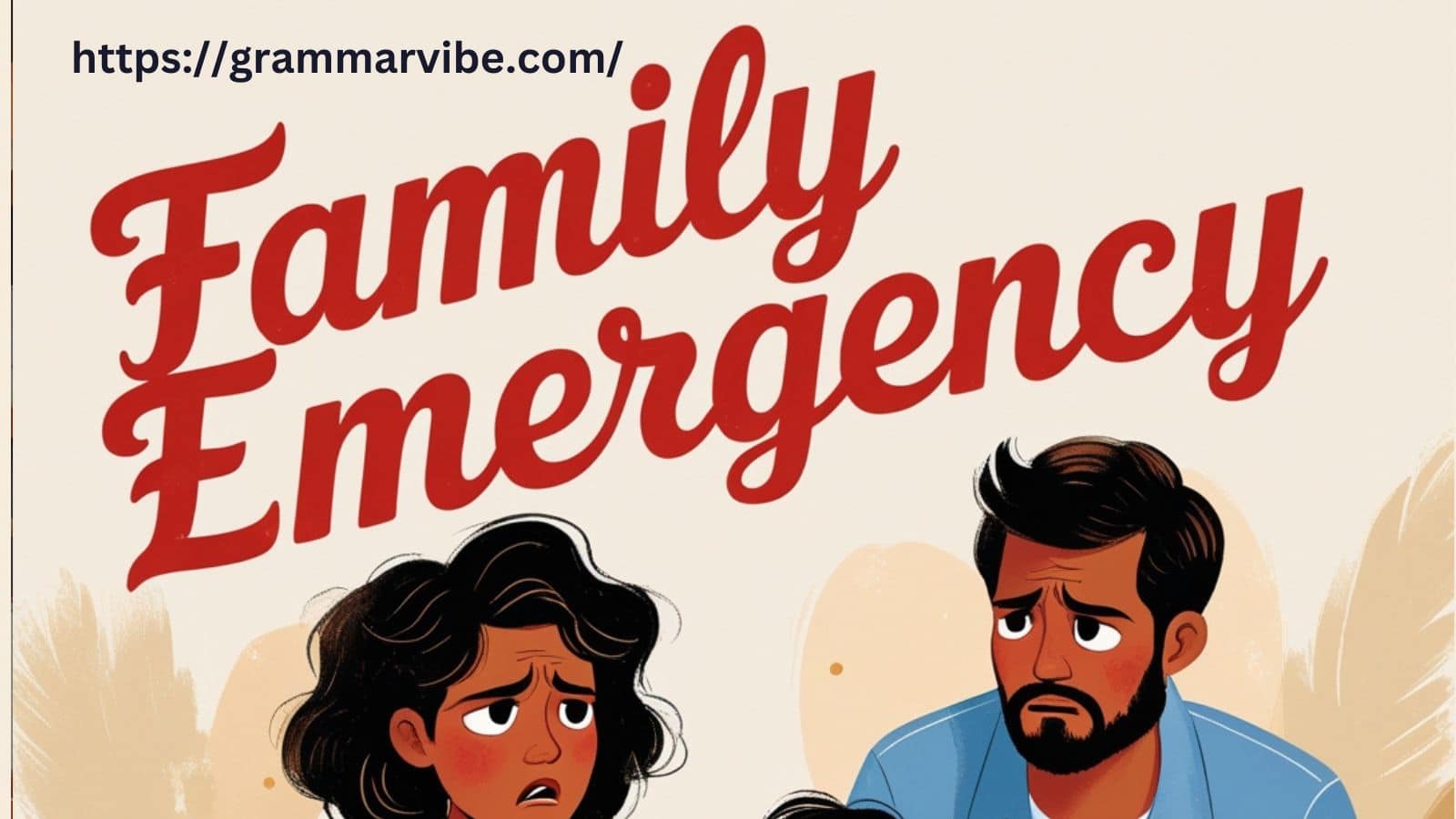When faced with a sudden or urgent family situation, communicating effectively is key—whether it’s in a professional or personal context. While “family emergency” is a commonly used phrase, there are plenty of alternative expressions you can use to convey similar meaning. The key lies in matching the tone to the context, whether you’re addressing a sensitive matter with colleagues, friends, or loved ones.
Here, you’ll learn how to use alternatives like “urgent family matter,” “family stuff,” and “pressing family concern” in a way that resonates with your audience while maintaining professionalism, empathy, and privacy. Whether you’re managing family issues at work or navigating social interactions during emergencies, understanding how to communicate family-related matters is an essential skill.
Urgent Family Matter
Sometimes you need to convey a sense of urgency without overexplaining the situation. Using the term “urgent family matter” is an ideal way to communicate the seriousness of the situation, especially in a professional setting. It strikes the balance between being formal and clear without delving into specifics.
Example: Email to a Colleague
Subject: Need to Leave Work Early
Hi Sarah,
I hope you’re doing well. I wanted to let you know that I have to leave early today due to an urgent family matter that requires my immediate attention. I’ll make sure to catch up on anything I miss as soon as possible.
Thanks for your understanding, John
This phrase maintains professionalism and conveys a sense of family obligations that cannot be postponed.
Family Stuff
When you’re speaking informally with friends or family, using “family stuff” is a laid-back and non-specific way to explain the situation. It’s casual, and it doesn’t reveal any sensitive details, making it perfect for social interactions during emergencies.
Example: Text Message to a Friend
Hey Mark, I’m going to have to reschedule our hangout tonight—some family stuff came up. I’ll let you know when I’m free again!
Here, you use this phrase to ensure the message is understood but keeps the situation private, providing a sense of family support system without going into depth.
Family Business

For situations where privacy is key, referring to something as “family business” is a discreet way to handle it. This expression is particularly useful when you want to keep the details of the situation out of public knowledge.
Example: Quick Phone Call to a Supervisor
Hi Lisa, I won’t be able to attend the meeting today due to some family business that I need to take care of. I’ll be back tomorrow, and I’ll catch up on the updates then.
This phrase subtly communicates that you’re dealing with private family matters without giving away too much information, preserving family dynamics.
Household Matter
Sometimes, it’s easier to use the term “household matter” when addressing an urgent family issue that pertains to something at home. This phrase provides a touch of formality while not being as vague as “family stuff.”
Example: Email to a Client
Dear Mr. Davis,
I regret to inform you that I need to leave early today due to a household matter that requires my attention. Please feel free to email me if there’s anything urgent that needs addressing.
Best regards,
Laura
Using “household matter” indicates that your attention is required for something in the domestic sphere without providing specifics, which can be especially important in professional communication.
More for you: 15 Synonyms for “Emotional Intelligence”
Family Problems
In some cases, you may need to address family problems openly, especially if the situation is one that others should be made aware of or requires immediate attention. This term reflects challenges within the family unit that need addressing.
Example: Text to a Close Friend
Hey Jen, I need to cancel tonight’s dinner. I’ve got some family problems I need to deal with, but I’ll reach out once things settle down.
Using “family problems” provides a more direct approach, especially in a personal excuse context where family challenges might be impacting your schedule.
Pressing Family Concern
For situations that require immediate attention, the term “pressing family concern” signals urgency and importance. It works well when you need to make it clear that the matter cannot be delayed.
Example: Phone Call to a Colleague
Hi Maria, I just wanted to give you a heads up that I won’t be able to attend the conference call today due to a pressing family concern. I’ll be sure to follow up with you afterward.
This phrase is professional and conveys that the issue at hand is not something that can be easily postponed, maintaining the focus on urgent family communication.
Critical Family Issue
A critical family issue often refers to something that requires immediate action, and this phrase is ideal when the situation is urgent, serious, and potentially life-changing. It is perfect for situations where time is of the essence.
Example: Text to a Supervisor
I need to step out of the office—there’s a critical family issue that requires my immediate attention. I’ll check in as soon as I can.
By using “critical family issue,” you communicate the family situation with gravity, highlighting the need for your swift action.
For your interest: 15 Other Ways to Say “Thank You for Sharing”
Immediate Family Situation
When you’re dealing with an urgent family situation that directly affects your close relatives, referring to it as an immediate family situation provides clarity and precision. It emphasizes that the matter concerns those closest to you.
Example: Email to a Team
Hi Team,
I’m sorry, but I need to leave due to an immediate family situation. I’ll keep you updated and make sure my tasks are covered as soon as possible.
This phrasing is perfect for professional communication when you want to make it clear that your absence is due to an important family matter but don’t want to disclose further details.
Sudden Family Event
A sudden family event refers to unexpected events that require immediate attention, such as an illness or emergency. It conveys that the situation arose without warning, which demands your prompt involvement.
Example: Text Message to a Friend
Hey Sarah, something came up—a sudden family event has come up, and I have to go. I’ll let you know when I’m free again!
This term works well in informal settings, maintaining a discreet communication style while also conveying the urgency of the situation.
Check out this: 15 Other Ways to Say “Have a Great Rest of Your Week”
Unexpected Family Circumstance

An unexpected family circumstance can range from a last-minute situation to an unforeseen emergency that requires your attention. It’s a neutral and polite way to explain the need for sudden time away.
Example: Phone Call to a Client
Hello, John, I need to take an urgent leave today due to an unexpected family circumstance. I’ll keep you posted and make sure everything is handled promptly.
This phrase is ideal for family-related emergencies that are unexpected but don’t require full disclosure. It maintains family privacy while still conveying a sense of urgency.
You might also like: 15 Other Ways to Say “I Will Let You Know”
Family Crisis
A family crisis is often associated with severe situations that require immediate attention and can often be overwhelming. The term captures a high level of seriousness and urgency.
Example: Email to a Boss
Dear Mr. Harper,
I’m writing to inform you that I have a family crisis that requires my immediate attention. I apologize for any inconvenience this may cause and will keep you updated on my status.
Best regards,
Anna
This expression is used when family problems have escalated to the point where urgent action is needed, making it appropriate for managing family problems in a professional setting.
Table: Summary of Synonyms for “Family Emergency”
| Phrase | Context | Example |
|---|---|---|
| Urgent Family Matter | Professional, formal setting | “I have an urgent family matter that requires my immediate attention.” |
| Family Stuff | Informal, casual communication | “Sorry, I need to reschedule, some family stuff came up.” |
| Family Business | Discreet, private family situations | “I have to step away for some family business.” |
| Household Matter | Formal, at-home related issues | “I need to handle a household matter and will return shortly.” |
| Family Problems | Personal, challenging family situations | “I can’t make it, dealing with family problems.” |
| Pressing Family Concern | Immediate, urgent family issues | “There’s a pressing family concern I need to address right now.” |
| Critical Family Issue | Serious, emergency situations | “I’m handling a critical family issue at the moment.” |
| Immediate Family Situation | Urgent, close family issues | “I have an immediate family situation that needs my attention.” |
| Sudden Family Event | Unexpected family events | “A sudden family event just occurred, and I need to leave.” |
| Unexpected Family Circumstance | Unexpected, unforeseen family issues | “I’m dealing with an unexpected family circumstance at the moment.” |
| Family Crisis | Severe, high-urgency family issues | “I’m in the middle of a family crisis, I’ll keep you updated.” |
FAQs
What should I say in a formal setting when I need to leave due to family reasons?
You can say “I have an urgent family matter” to maintain professionalism and convey the seriousness of the situation.
How do I explain a family emergency in a casual conversation?
A simple “I’ve got some family stuff to take care of” works well in informal settings, keeping things light but clear.
What is the best way to communicate a private family issue?
Using “family business” helps to keep things discreet while still indicating that it’s a personal matter requiring attention.
How do I communicate a family emergency to my employer?
An “immediate family situation” or “pressing family concern” is a respectful and professional way to inform your employer.
Can I use “family problems” in professional communication?
“Family problems” may sound too casual, but it can be used depending on the nature of your workplace and the relationship you have with your employer.
Conclusion
When dealing with urgent family matters, it’s important to communicate clearly and appropriately. Using the right phrases ensures you maintain professionalism while respecting your privacy. Whether you use “urgent family matter” for formal situations or “family stuff” for casual ones, these alternatives help convey the urgency without oversharing. Each phrase has its place, making it easier to handle unexpected events with clarity and tact.
Choosing the right way to express a family emergency can make communication smoother, whether at work or in personal situations.

Kyren Paul is an experienced blogger and the creative mind behind “Grammar Vibe.” With a passion for the nuances of English grammar, he brings clarity and insight to everyday language topics, making grammar accessible and engaging for readers of all levels.











Leave a Comment